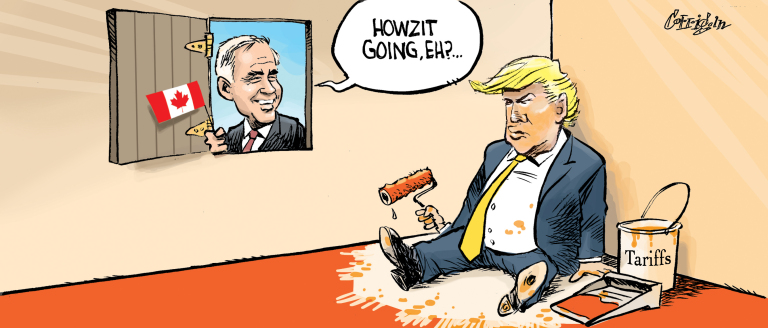
In the couple of months since his second term began, President Trump’s attacks on the Canadian economy and sovereignty have given rise to a fair bit of anger from Canadians. Yes, we are nice, but we have our limits. Trump’s tariffs, and promises of more, despite having signed onto a new free-trade agreement with Canada and Mexico near the end of his first term, and his threats to make Canada the 51st state, have enraged Canadians to the point that these issues are top of mind for nearly everyone here.
The response is taking several forms. Certainly the Canadian government has been clear it will retaliate with tariffs of its own and has signalled a willingness to pursue other economic measures such as export taxes on energy to the the U.S. Canadian politicians from all parties have loudly rejected challenges to our sovereignty.
The people of Canada have also signalled what they think as they cancel trips to the United States either as a political statement or because they have concerns about how non-citizens might be treated. The New York Times has reported that Canadian airlines are “eliminating tens of thousands of seats to the United States this April, a peak period when Canadians travel to warmer destinations.” There is considerable community effort to encourage Canadians to avoid buying goods made in America, and all sorts of social media activity encouraging Canadians to keep their “elbows up,” a hockey reference essentially calling on Canadians to remain strong in the face of threats made by Trump and his administration.
For many of us, the single most interesting development is what it has done to our electoral politics. Prior to the beginning of Trump’s second term, Prime Minister Justin Trudeau, leader of the Liberal Party of Canada, was trailing his main opponent Pierre Poilievre of the Conservative Party by as much as 25 points in the polls. Trudeau stepped down and Mark Carney, former head of both the Bank of Canada and the Bank of England, was chosen as new leader of the Liberal Party, becoming prime minister in the process. Whether or not Trudeau would have been able to close the gap with Poilievre in the face of Trump’s aggressive actions is a moot point as his leadership had become untenable.
Mark Carney has closed the gap and more, erasing Poilievre’s lead in the polls, going ahead by 5 points according to an aggregation of polls. This change is based on the simple fact that Canadians have decided Carney is in the best position stand to to Trump.
According to a report from Ipsos:
“Mark Carney is thought to be the best federal party leader to help Canada navigate challenges associated with the Donald Trump Presidency, performing well ahead of Justin Trudeau on the same measures. By contrast, Pierre Poilievre is the candidate chosen by Canadians as most likely to roll over and accept whatever President Trump demands…”
If you have any doubt how serious Canada is about the threat Donald Trump poses, know that a more than 30 point swing in the polls has taken place based upon the belief that the incumbent Liberal Party and it’s leader will do a better job on this one question. The general election will take place on April 28th.
Earlier this week, Carney had a phone call with Trump which was characterized by both parties as positive. According to reports, Trump signalled more respect for Canadian sovereignty in discussions with Carney and may even have suggested that new world-wide tariffs to be announced on Wednesday will not fall as heavily on Canada as previously thought. Perhaps a good signal but we also know things can change in an instant.
It should be noted that all of the above is within the realm of fairly normal politics. There is much unpleasantness, but these things can, let us hope, be managed. The other side is what might happen if Donald Trump decides he no longer wishes to play by the rules of the game either at home or abroad. What can we possibly say about this very real possibility other than a call to work together to make it unbearably costly for him to go that route? Canadians have so far refused to capitulate and been clear that it will respond to Trump’s bullying in any and all ways proportionate to the challenge.
In Timothy Snyder’s useful little book On Tyranny: Twenty Lessons From the Twentieth Century, his first lesson is to “not obey in advance.” He writes:
“Most of the power of authoritarianism is freely given. In times like these, individuals think ahead about what a more repressive government will want and then offer themselves without being asked. A citizen who acts in this way is teaching power what it can do.”
With the appropriate adjustment to the world of international relations, Canada never considered obeying in advance and it may have caught Trump by surprise.
Growing up in the United States as I did, I can say that most Americans know very little about Canada but they are learning, especially the president and those around him.
Retired political staffer/civil servant. Dual U.S./Canadian citizen writing about politics and the arts on both sides of the border.
















